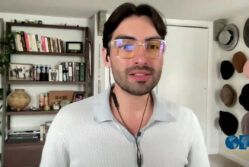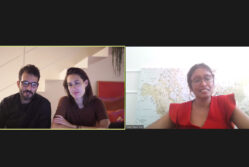
Panel on the Shia and Sunni Divide
News events roiling in the Middle East right now from the civil war in Syria to the episodic uprisings in Bahrain to a recent spate of bombings in post-war Iraq all have a historical theme and an ancient enmity running through them: the Sunni-Shia divide.
To help frame these news stories and to mark the 10th anniversary of the war in Iraq, the OPC will hold a panel discussion that will explore the history and the modern politics of the Sunni and Shia divide in the Muslim world.
“It’s a critical time to deepen our understanding of the Sunni and Shia divide and to analyze how contemporary politics so often fans the flames of this division. It’s been a truism throughout many centuries, but recently there seems to be a distinct uptick in the tensions in Syria, in Bahrain, in Iraq, in Pakistan and elsewhere,” said Charles M. Sennott, Executive Editor of GlobalPost, which is launching a multi-part series on the issue.
The divide dates back to the death of the Prophet Muhammad and the division in ideology, religion and politics. Muslims were torn between electing a head-of-state or having a family member of Muhammad’s be the successor. A friend of the Islamic prophet Muhammad was elected and this caused a split that continues; Sunnis agreed with the decision to elect a leader, while Shias recognized Ali ibn Abi Talib, as the family member of Muhammad’s to be their leader, or as the Shia see it, Islam’s first Imam and the rightful successor to Muhammad.
Today, 85 percent of Muslims are Sunnis who recognize the decision to elect a successor. The largest population of the minority Shia Muslims resides in Iran and Iraq while large minority communities of Shia also live in Yemen, Bahrain, Syria and Lebanon. While the two streams of Islam share many of the same philosophies, rituals and beliefs, the fundamental point of an elected or bequeathed leadership remains, and at times further erodes, the division in religion and politics.
The OPC has assembled a panel to help navigate how the history of the Sunni-Shia divide informs the present-day politics and geography in the Middle East:
Mohamad Bazzi is an assistant professor of journalism at New York University where he teaches international reporting. At the Council on Foreign Relations he is an adjunct senior fellow for Middle East studies and was their 2008 Edward R. Murrow Press Fellow. Bazzi was the Middle East bureau chief at Newsday from 2003 to 2007. He has written extensively about militant Islam, regional politics, the war on terror and is currently writing a book about the struggle between Saudi Arabia and Iran, titled The Quiet War.
Charles M. Sennott is the executive editor and co-founder of GlobalPost, the web-based site for international news. Before this new venture, Sennott was a long time foreign correspondent for The Boston Globe serving as Middle East bureau chief based in Jerusalem from 1997 to 2001. Sennott is a frequent analyst of the Middle East for the BBC, CNN, PBS NewsHour and NPR.
Louise Roug, foreign editor of Newsweek and The Daily Beast, was a foreign correspondent for the Los Angeles Times in Iraq and the Middle East
from 2004-2007. She lectures and writes extensively on US foreign policy and the Middle East.
Calvin Sims, Program Officer, Freedom of Expression Unit of the Ford Foundation, will moderate the panel. Prior to joining the Ford Foundation in 2007, Calvin spent two decades at The New York Times as a foreign correspondent in Buenos Aires, Tokyo and Jakarta.
The event takes place on Wednesday, March 13. Reception begins at 6 p.m. at Club Quarters, 40 West 45 Street, and the panel discussion will begin at 6:30 p.m. To RSVP, call the OPC at 212-626-9220 or e-mail.


